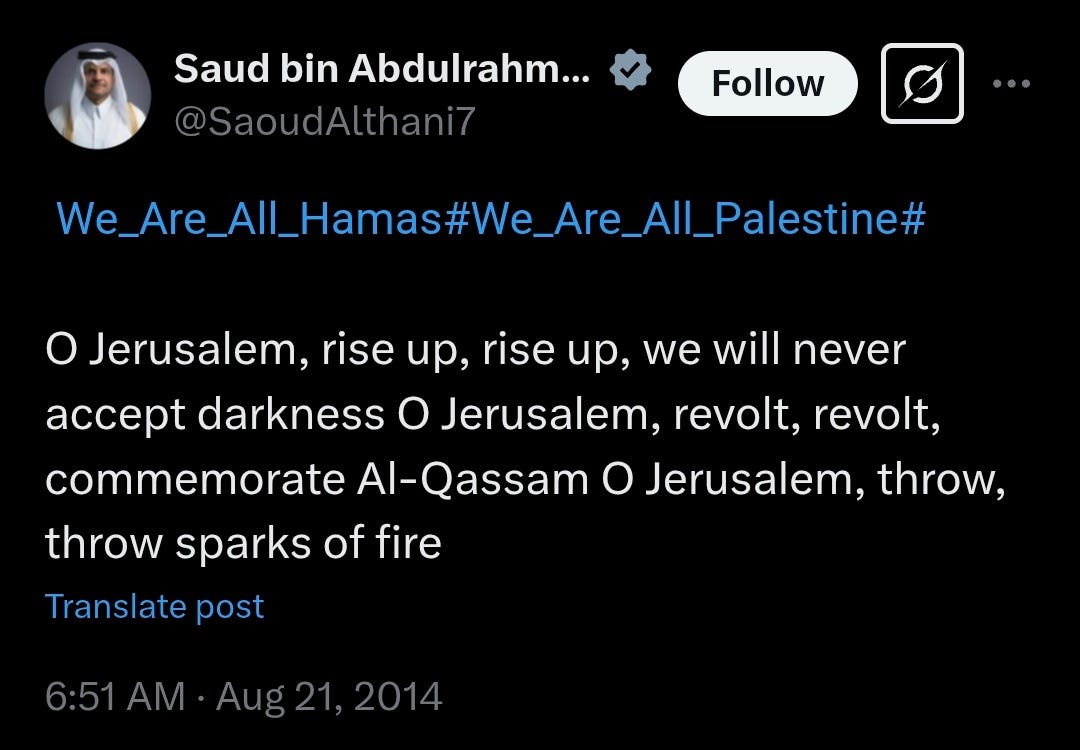Trump Should Listen to Qatar’s Own Words
On one hand, lavish real estate investments and global conferences; on the other, direct support for Hamas, demonizing Trump, and antisemitic statements that would make Kanye West blush
As Donald Trump prepares land in Qatar this week — the first visit by a U.S. president since the Gulf state’s entanglement in the October 7 attacks began drawing renewed scrutiny in Washington — it’s paramount that his administration understand exactly who they’re dealing with.
Few regimes have mastered the art of duplicity quite like Qatar: On one hand, glitzy PR campaigns, lavish real estate investments, and global counterterror conferences; on the other, direct support for Hamas and antisemitic statements that would make Kanye West blush. The cracks in the facade become visible during those fleeting moments when Qatar lets its guard down — when it speaks under the assumption that nobody in the West is listening.
Qatar’s longstanding ruse has led many ostensibly well-meaning individuals to view it as a responsible mediator in global conflicts and a partner for business, diplomacy, and progress. Among these people is Steve Witkoff — President Trump’s Special Envoy to the Middle East and trusted negotiator, who has been working closely with the Qataris on a ceasefire in the Hamas-Israel war. During a recent appearance on Tucker Carlson’s podcast, Witkoff described Qatar as “well-motivated” and “good,” adding that the regime had “moderated quite a bit.”
Yet the mirage of morality vanishes the moment you take a hard look at what Qatari officials actually say — both in public statements and through its state-run media.
Take the Qatari Shura Council, the country’s top legislative body. After the assassination of Hamas leader Ismail Haniyeh in the summer of 2024, the Speaker of the Council, Hassan bin Abdullah Al-Ghanim, delivered a glowing tribute to him, praising Haniyeh for “embodying the highest meanings of sacrifice and determination” and “defending the legitimate rights of the Palestinian people.”
Even more revealing are the statements of Sa'oud bin Abdulrahman Al Thani, now Qatar’s Deputy Prime Minister and Minister of Defense. In 2014, during fighting between Israel and Hamas, Al Thani tweeted “We Are All Hamas” and “Revive the memory of [Izz Al-Din] Al Qassam” — a reference to Hamas’ military brigade.
In 2021, Al Thani tweeted that “Israel’s control of the U.S. is clear,” and that Qatar must “plan how to influence the decision-makers in the U.S.”
Qatari Education Minister Lolwah Alkhater, for her part, described Ismail Haniyeh as a "righteous servant" and a man of "miracles” following his assassination by Israel. Likewise, she wrote a poem glorifying Haniyeh’s successor and October 7th mastermind, Yahya Sinwar, following his death.
Sheikha Moza bint Nasser, the mother of Qatar’s Emir and head of the Qatar Foundation — which has funneled billions onto American colleges campuses — similarly eulogized Sinwar, writing that “The name Yahya means the one who lives…. They thought him dead but he lives. Like his namesake, Yahya bin Zakariya, he will live on and they will be gone.”
Such sentiments are not limited to politicians. Jaber Al-Harmi, editor-in-chief of Qatar’s government-controlled Al Sharq newspaper, has glorified violence against Jews. In one post, he quoted the infamous hadith: “The Hour of Judgment will not come until we fight the Jews and kill them.” In another, he published a statement from Hamas’ Qassam Brigades vowing to “harvest the heads” of their enemies. He even shared an image of Yahya Sinwar brandishing a gun, captioned: “In the name of God, we begin the negotiations.” That caption offers a troubling glimpse into the regime’s mindset about how it may actually perceive the negotiations it has played such a significant role in.
And when it comes to Trump himself, the Qatari press isn’t subtle. A government daily recently ran a piece describing the former president as a “terrorist” bent on destroying the global order and sowing chaos throughout the world. These aren’t fringe blog posts – they’re sanctioned narratives that openly vilify the very man now being courted by Qatar as a diplomatic partner.
Yet, none of this has stopped Trump from (potentially) accepting a sprawling, $400 million luxury plane to replace Air Force One, dubbed the “Palace in the Sky.” The timing, paired with Qatar’s well-established strategy of using wealth to buy favor and influence, should set off alarms. But alas, the pushback from Trump’s base has been negligible.
Unfortunately, too few are willing to open their ears and listen. And when Qatar does face rare moments of public criticism, a ready chorus rushes to shout down the dissenters as ignorant or prejudiced — as happened just last month in the halls of the U.S. Senate, when Senator Roger Marshall lashed out at a witness for linking Qatar to antisemitism, accusing him of “prejudice” and hailing the regime as “a great ally to America.”
Money doesn’t launder morality. And slick branding doesn’t erase the blood that Qatar’s funding and rhetoric have enabled to be spilled.
This isn’t to suggest that a major power like the United States can necessarily avoid engaging with the occasional terror-sponsoring regimes — such is the unfortunate reality of geopolitics. But at a minimum, it must engage with our eyes wide open, and our ears tuned to the truth. And, just maybe, the U.S. shouldn’t accept $400 million planes from them either.
If the Trump administration insists on treating Qatar as a credible mediator between the West and Islamist terrorist groups, then it cannot afford to be blinded by its wealth and charm. It must be willing to hear Qatar’s real voice — the one it speaks when it thinks no one is listening — and act accordingly.







